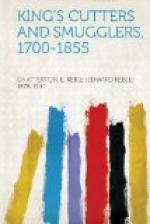[Illustration: Chater hanging at the Well in LADY HOLT Park, the Bloody Villains Standing by.]
[Illustration: The Bloody Smugglers flinging down Stones after they had flung his Dead Body into the Well.]
I have omitted the oaths and some of the worst features of the incident, but the above outline is more than adequate to suggest the barbarism of a lot of men bent on lawlessness and revenge. Drunk with their own success, the gang now went about with even greater desperation. Everybody stood in terror of them; Custom officers were so frightened that they hardly dared to perform their duties, and the magistrates themselves were equally frightened to convict smugglers. Consequently the contraband gangs automatically increased to great numbers. But, finally, a reward of L500 was offered by the Commissioners of Customs for the arrest of everyone of the culprits, and as a result several were arrested, tried, convicted, and executed. The murderers were tried at a special assize for smugglers held at Chichester, before three judges, and the seven men were sentenced to death. William Jackson died in prison a few hours after sentence. He had been very ill before, but the shock of being sentenced to death, and to be hung afterwards in chains and in ignominy, rapidly hastened his death, and relieved the executioner of at least one portion of his duty. He had been one of the worst smugglers in his time, and was even a thief among thieves, for he would even steal his confederates’ goods. Between the sentence and the hour for execution a man came into the prison to measure the seven culprits for the irons in which their bodies were subsequently to be hung by chains. And this distressed the men more than anything else, most of all Jackson, who presently succumbed as stated.
Mills, senior, had gradually been drawn into the smuggling business, though previously he had been quite a respectable man. After giving up actual smuggling, he still allowed his house to be used as a store-place for the contraband goods. His son, Richard, also one of the seven, had been concerned in smuggling for years, and was a daring fellow. John Cobby, the third of the culprits, was of a weaker temperament, and had been brought under the influence of the smugglers. Benjamin Tapner was especially penitent, and “hoped all young people would take warning by his untimely fate, and keep good company, for it was bad company had been his ruin.” William Carter complained that it was Jackson who had drawn him away from his honest employment to go smuggling, but John Hammond was of a more obdurate nature, and had always hated the King’s officers.




